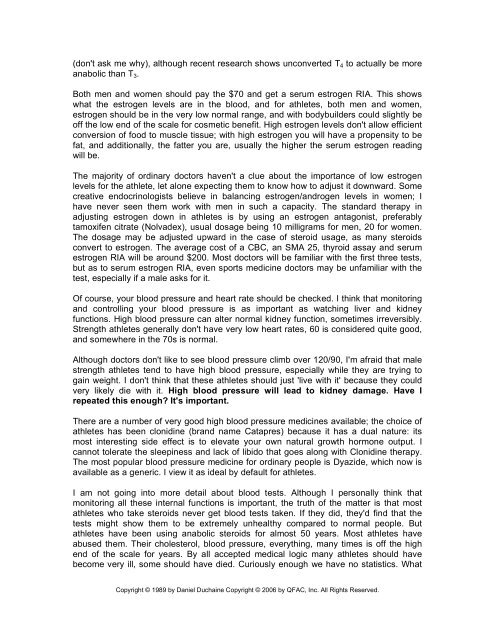Underground Steroid Handbook 2
Create successful ePaper yourself
Turn your PDF publications into a flip-book with our unique Google optimized e-Paper software.
(don't ask me why), although recent research shows unconverted T 4 to actually be more<br />
anabolic than T 3 .<br />
Both men and women should pay the $70 and get a serum estrogen RIA. This shows<br />
what the estrogen levels are in the blood, and for athletes, both men and women,<br />
estrogen should be in the very low normal range, and with bodybuilders could slightly be<br />
off the low end of the scale for cosmetic benefit. High estrogen levels don't allow efficient<br />
conversion of food to muscle tissue; with high estrogen you will have a propensity to be<br />
fat, and additionally, the fatter you are, usually the higher the serum estrogen reading<br />
will be.<br />
The majority of ordinary doctors haven't a clue about the importance of low estrogen<br />
levels for the athlete, let alone expecting them to know how to adjust it downward. Some<br />
creative endocrinologists believe in balancing estrogen/androgen levels in women; I<br />
have never seen them work with men in such a capacity. The standard therapy in<br />
adjusting estrogen down in athletes is by using an estrogen antagonist, preferably<br />
tamoxifen citrate (Nolvadex), usual dosage being 10 milligrams for men, 20 for women.<br />
The dosage may be adjusted upward in the case of steroid usage, as many steroids<br />
convert to estrogen. The average cost of a CBC, an SMA 25, thyroid assay and serum<br />
estrogen RIA will be around $200. Most doctors will be familiar with the first three tests,<br />
but as to serum estrogen RIA, even sports medicine doctors may be unfamiliar with the<br />
test, especially if a male asks for it.<br />
Of course, your blood pressure and heart rate should be checked. I think that monitoring<br />
and controlling your blood pressure is as important as watching liver and kidney<br />
functions. High blood pressure can alter normal kidney function, sometimes irreversibly.<br />
Strength athletes generally don't have very low heart rates, 60 is considered quite good,<br />
and somewhere in the 70s is normal.<br />
Although doctors don't like to see blood pressure climb over 120/90, I'm afraid that male<br />
strength athletes tend to have high blood pressure, especially while they are trying to<br />
gain weight. I don't think that these athletes should just 'live with it' because they could<br />
very likely die with it. High blood pressure will lead to kidney damage. Have I<br />
repeated this enough? It's important.<br />
There are a number of very good high blood pressure medicines available; the choice of<br />
athletes has been clonidine (brand name Catapres) because it has a dual nature: its<br />
most interesting side effect is to elevate your own natural growth hormone output. I<br />
cannot tolerate the sleepiness and lack of libido that goes along with Clonidine therapy.<br />
The most popular blood pressure medicine for ordinary people is Dyazide, which now is<br />
available as a generic. I view it as ideal by default for athletes.<br />
I am not going into more detail about blood tests. Although I personally think that<br />
monitoring all these internal functions is important, the truth of the matter is that most<br />
athletes who take steroids never get blood tests taken. If they did, they'd find that the<br />
tests might show them to be extremely unhealthy compared to normal people. But<br />
athletes have been using anabolic steroids for almost 50 years. Most athletes have<br />
abused them. Their cholesterol, blood pressure, everything, many times is off the high<br />
end of the scale for years. By all accepted medical logic many athletes should have<br />
become very ill, some should have died. Curiously enough we have no statistics. What<br />
Copyright © 1989 by Daniel Duchaine Copyright © 2006 by QFAC, Inc. All Rights Reserved.


